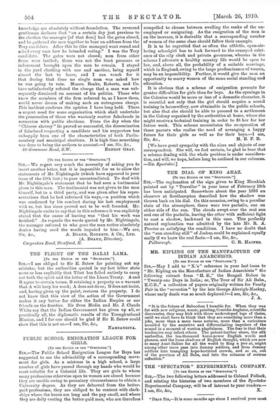PUBLIC SCHOOL EMIGRATION LEAGUE FOR GIRLS.
LTO THE EDITOR OP THE "SracrAmos.'1 SIR,—The Public School Emigration League for Boys has suggested to me the advisability of a corresponding move- ment for girls. As a mistress in a high school, a large number of girls have passed through my hands who would be most suitable for a Colonial life. They are girls to whom many professions otherwise open to women are closed because they are unable owing to pecuniary circumstances to obtain a University degree. As they are debarred from the better- paid professions, they are obliged to be content with clerk- ships where the hours are long and the pay small, and where they are daily costing the better-paid men, who are therefore
compelled to choose between swelling the ranks of the un- employed or emigrating. As the emigration of the men is on the increase, it is desirable that a corresponding number of women of the same class should follow their example.
It is to be regretted that so often the athletic, open-air- loving schoolgirl has to look forward to the cramped exist- ence of the city clerk and private governess, whereas in the scheme I advocate a healthy country life would be open to her, and, above all, the probability of a suitable marriage, which in England, owing to the large predominance of women, may be an impossibility. Further, it would give the men an opportunity to marry women of the same social standing and education.
It is obvious that a scheme of emigration presents far greater difficulties for girls than for boys. As the openings in the Colonies would be more or less of a domestic character, it is essential not only that the girl should acquire a sound training in housewifery, now obtainable in the public schools, but also that she should be able to proceed to a settlement in the Colony organised by the authorities at home, where she might receive a technical training in order to fit her for her future work. This scheme necessitates the co-operation of those parents who realise the need of arranging a happy future for their girls as well as for their boys.—I am,
[We have great sympathy with the aims and objects of our correspondent. She will, we feel certain, be glad to hear that a scheme dealing with the whole problem is under considera- tion, and will, we hope, before long be outlined in our columns. —En. Spectator.]






































 Previous page
Previous page